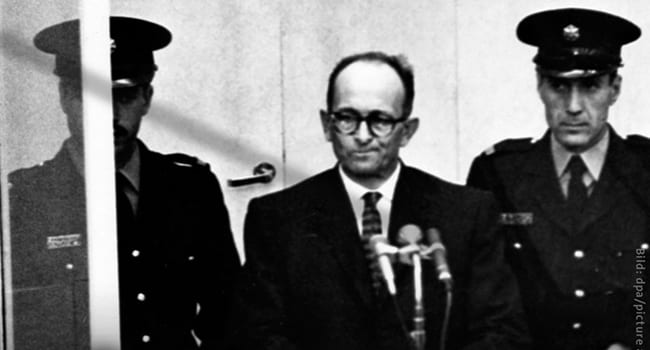 On May 23, 1960, Israel announced the capture of Adolf Eichmann. An undercover Israeli security services team had snatched him 12 days earlier in Buenos Aires, Argentina, and smuggled him out of the country by air.
On May 23, 1960, Israel announced the capture of Adolf Eichmann. An undercover Israeli security services team had snatched him 12 days earlier in Buenos Aires, Argentina, and smuggled him out of the country by air.
The story was an immediate international sensation.
If you were only moderately conversant with the Holocaust, you might never have heard of Eichmann before then. But over the next couple of years, he was rarely out of the news.
Born in Germany in 1906, Eichmann moved to Linz, Austria, in 1914 because of his father’s work. There was nothing notable about him before he joined the Austrian Nazi Party in 1932. Then it was as if he’d found a role in life, so much so that he moved back to Germany to continue political activity when the Austrian party was banned the following year.
Eichmann has been characterized as a joiner, someone who derived his sense of identity and self-worth from the organizations to which he belonged. If not a leader or thinker in his own right, he was the industrious implementer of policy directions devised by others.
Indeed, organization was Eichmann’s forte. Assigned overall responsibility for deporting Jews to the death camps, he collected the requisite names and addresses, seized their property and arranged transportation. And he was very thorough. You might even call him zealous and innovative.
To his captors, Eichmann was thus the Architect of the Holocaust, which made him an extraordinarily valuable catch. He could be cast as the epitome of Nazi evil.
Eichmann hid in Germany for several years after the war until help came from the infamous ratlines network – a group of Nazi sympathizers whose membership included well-connected Catholic clergy. With their assistance, he procured a false identification, a Red Cross passport and Argentine landing papers. In June 1950, he sailed from Genoa, Italy, and arrived in Buenos Aires the following month. His family joined him in 1952.
Eichmann wasn’t always discreet during his Argentinian years. He met with other Nazis, reminisced about the past, hypothesized about a possible Nazi restoration and gave interviews with a view to publishing a biography. There was no evidence of second thoughts, guilt or remorse.
Reaction to Eichmann’s capture varied from delighted astonishment to disquiet about the circumstances.
Those in the latter camp noted the illegal nature of his seizure and Argentina formally protested the violation of its sovereignty. Israel tried to deflect by claiming the snatch was a private endeavour. Nobody believed it.
There were also qualms about him being tried in a country that wasn’t the location of the crimes and didn’t formally exist when they were perpetrated. Maybe he should be handed over to West Germany. Or perhaps to an international tribunal.
But Israel wasn’t budging. They had him and they weren’t giving him up.
Long and riveting, Eichmann’s 1961 trial functioned on two levels.
One level had to do with his personal complicity. Was he a responsible, willing actor or just a hapless cog in the machine?
The other level was much bigger than the fate of a single man. To quote Neal Bascomb: “The trial’s purpose was to put the Holocaust on trial. And Eichmann was a tool to that end.”
The defence took the approach of downplaying Eichmann’s personal importance. He was, he claimed, merely following orders. Rather than being the one who approved the liquidation program, he was just a loyal officer in a role that largely revolved around establishing train schedules.
Hannah Arendt wrote extensively about the trial, coining the term “banality of evil.” The man in the dock was neither a monster nor a fanatic. He was boring, mundane and not particularly intelligent, an example of how very average people can partake in atrocities given the right conditions.
This view proved highly controversial then and since. Critics assert that Arendt saw what fitted her prior thesis about behaviour in totalitarian societies and was also deceived by the persona Eichmann opted to project during the trial. And she didn’t have full access to his Argentine musings.
In the hours before he was hanged, Eichmann reputedly asked for a bottle of wine and drank about half of it. He expressed no remorse for his actions.
His corpse was cremated and the ashes dumped in the sea outside Israeli territorial waters. There was to be no posthumous tainting of Jewish soil.
Troy Media columnist Pat Murphy casts a history buff’s eye at the goings-on in our world. Never cynical – well, perhaps just a little bit.
The views, opinions and positions expressed by columnists and contributors are the author’s alone. They do not inherently or expressly reflect the views, opinions and/or positions of our publication.


